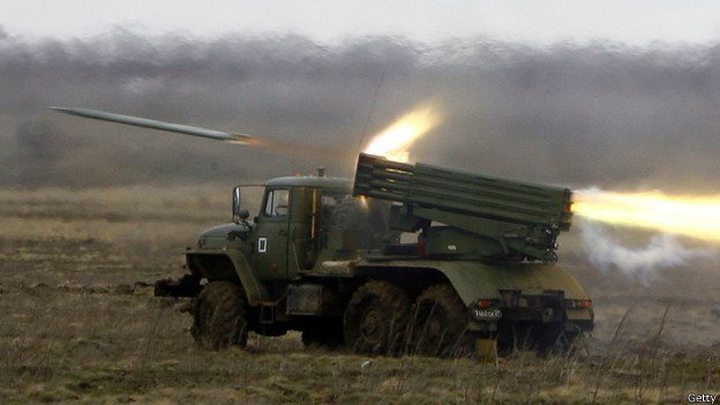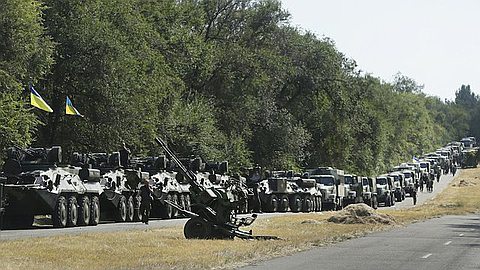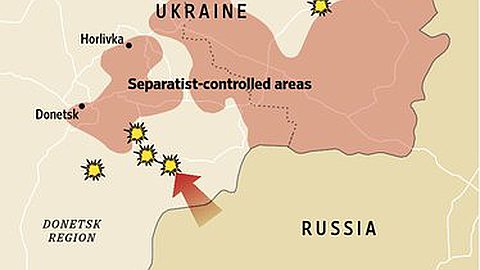Ukraine Refugees Caught in Crossfire

Rebels denied any role in the attack, or that an attack had taken place. The U.S. State Department condemned the "shelling and rocketing" of the convoy but said it couldn't confirm who was responsible.
Interviews at three different refugee camps in recent days showed that anger over shelling in residential areas is hampering the Kiev government's efforts to win the trust of people in the east.
On Monday, Ukrainian officials said a refugee convoy of several vehicles was displaying white flags as it traveled through an area where intense fighting had taken place. The buses were hit by rockets and mortars, the officials said, leaving some of the occupants, including women and children, to burn to death. The officials said dozens of people who had left the besieged rebel-held city of Luhansk were killed, though an exact death toll wasn't available.
"They tried to get away from the fighting and instead became victims of it," said State Department spokeswoman Marie Harf.
A spokesman for the pro-Russia rebels said the report was a product of Kiev propaganda, according to the Interfax news agency.
The back-and-forth over the refugee convoy offered the latest reminder of the high stakes in the Ukraine conflict, which the United Nations says has already claimed more than 2,000 lives and led to the most intense confrontation between Russia and the West since the Cold War. European diplomats tried in recent days to restart talks aimed at a cease-fire, but Ukraine appears to be pushing ahead in its campaign to try to rout separatists on the battlefield in the east.
Even if Kiev manages to maintain an upper hand over the separatists, civilian deaths over the last four months are likely to continue to haunt Ukraine's pro-Western government.
Natasha Kozinko said she didn't know who fired the shell that exploded earlier this month near the Jewish children's center where she was taking refuge in Luhansk. But she knew it meant she had to get out.
"Everyone is yelling, 'We're defending you! We're liberating you!'" said Ms. Kozinko, a 35-year-old mother of three who is now at a refugee camp in the central Ukrainian town of Zhytomyr. "I don't know the reality. I know that people are dying."
As Ukrainian forces have bombarded pro-Russia rebels in Luhansk in recent weeks, thousands of civilians have poured out of what was once a city of more than 400,000, now without water and electricity and running low on food.
Ukrainian troops claim they have already surrounded and taken control of part of the city, and the fighting is intensifying.
But if Ukraine is able to retake Luhansk and other parts of rebel-held eastern Ukraine, it will face the daunting task of restoring a social order torn apart by bombings from both sides, leaving homes and lives destroyed and locals unsure whom to blame.
People fleeing eastern Ukraine report pro-Russia rebels setting up artillery in residential areas, firing, and leaving. But they also voice dismay that Ukrainian government forces appear to be returning such rebel fire with strikes that can lead to civilian casualties, and they puzzle over why Ukraine can't mount more precise attacks. As a result, many hesitate to fully endorse the government's actions.
"I never could imagine that you could have such a strange war in the 21st century," said Elena Yarylchenko, also from Luhansk, "when you have satellite intelligence that can make out schools of fish in the ocean."
Ukrainian officials insist that they do all they can to avoid civilian casualties, and that the rebels often fire directly into residential areas to stir up the local population. But the broadening trauma of war presents a challenge for the Kiev government as its offensive against the separatists makes gains. Even if it defeats the pro-Russia rebels, Kiev will still have to wage a concerted effort to win hearts and minds.
In interviews at two refugee camps in Ukraine and one just across the border in Russia, those fleeing the violence often voiced distaste for the separatists, but also skepticism and doubt over the aims of Ukraine's pro-Western leaders. The discontent could itself be a win for Russian President Vladimir Putin, who Ukrainian officials and Western analysts say has sought to undermine the new government by fomenting political, ethnic, and military tensions inside Ukraine to keep it out of the West's orbit.
Moscow denies it is aiding the separatists and says Ukraine's new government is at fault for alienating the population in the east, which has close ties to Russia. The Kremlin has sought to keep the international focus on the humanitarian crisis inside rebel-held eastern Ukraine, blaming Kiev for the suffering and dispatching a convoy of nearly 300 trucks carrying food and other aid. Those trucks remained parked on the Russian side of the border on Monday as negotiations over how they would cross over continued.
This is "a war from the top," said Sveta Turilkina, who had come from the Luhansk region to a makeshift refugee camp in Kiev. "We're the ones suffering."
Ms. Turilkina, 33 years old, used to sell men's underwear at a market before the war shut it down. After first leaving for the port city of Mariupol, she, her daughter, and her husband packed their bags again and joined three dozen other members of their church to come to Kiev, where a church group had turned an abandoned factory into a refugee camp for more than 200 people.
The residents sleep on bunk beds wrapped with gray tarpaulins for privacy, arrayed in rows in a dark hangar near a factory that makes cement building materials. Towels, jackets, and the odd men's sport coat hang from the makeshift wood walls.
Ms. Turilkina said her mother stayed behind, and when she finally reached her a week ago, the older woman said a shell had exploded near a supermarket as she was shopping, killing several people drinking beer outside.
"Who launched it? For what?" Ms. Turilkina asked. "Nobody understands."
The United Nations says at least 117,000 people have been internally displaced inside Ukraine, and that an estimated 168,000 had crossed into Russia as of Aug. 1. It said at least 2,086 people were killed in the conflict from mid-April to Aug. 10.
At a refugee camp in Donetsk, Russia, near the Ukrainian border, some said they had turned against Ukraine during the conflict and supported the separatists. A woman who only gave her name as Valeriya said the separatist militias offered protection from Ukrainian aggression.
"We're Donbas, not Ukraine anymore," referring to the region in the country's east. "And the militia are our people, they are defending us, showing us where to go."
A husband and wife in their 30s who used to run a pizza restaurant in a town near Luhansk said some people had looked to Mr. Putin for help, hoping he would send in troops. Now, family members who are still there are holding out for Russian humanitarian aid that is stuck at the border, they said.
"People still hope for something," said the wife, who gave her name only as Irina.
Only four months old, the war is already imprinting itself in the national consciousness. The terminology of the Soviet-era military equipment used by both sides in the conflict is becoming embedded in the language at refugee camps and conflict zones. There is the Grad truck-mounted multiple rocket launcher, named after the Russian word for hail, and the BTR, the Russian acronym for armored personnel carrier.
Ms. Yarylchenko, 51, ran a Jewish children's center in Luhansk that took in refugees from the Jewish community as shelling elsewhere in town intensified. When the shelling got closer to the center, the residents moved to the basement, bringing down an old gas stove that they used to bake bread. When the water stopped running, they worked in shifts for several hours to dig a hole outside for a toilet. Just over a week ago, a Jewish organization took in Ms. Yarylchenko and people staying with her at a camp for Jewish refugees in Zhytomyr.
Ms. Yarylchenko recalled that a three-year-old girl in Luhansk had told her matter-of-factly: "When the BTR's go to sleep, I can go for a walk outside."





